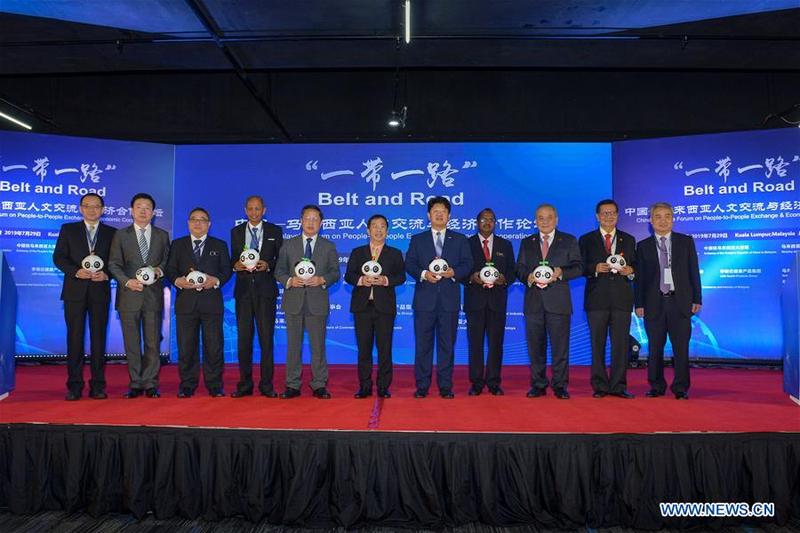



People-to-people engagements are key to giving the China-proposed Belt and Road Initiative (BRI) a human touch, according to Malaysian government officials and experts speaking at a forum discussing the human aspect of the infrastructure network on Monday.

Chinese Ambassador to Malaysia Bai Tian (5th R) and Malaysian government's special envoy to China Tan Kok Wai (6th L) pose for photos with other guests during the China-Malaysia Forum on People-to-People Exchange and Economic Cooperation in Kuala Lumpur, Malaysia, July 29, 2019. People-to-people engagements are key to giving the China-proposed Belt and Road Initiative (BRI) a human touch, according to Malaysian government officials and experts speaking at a forum discussing the human aspect of the infrastructure network on Monday. [Photo/Xinhua]
Speaking at the China-Malaysia Forum on People-to-People Exchange and Economic Cooperation here, Tan Kok Wai, Malaysian government's special envoy to China, said the BRI emphasized five links: policy communication, facility connectivity, smooth trade, capital finance and people's hearts.
"Among them, the closest to the grassroots mass, the most uncontroversial, is the community of the people. Whether it is political cooperation or economic and trade, it must have the foundation of the people's heart. The commonality of the people is the top priority in the cooperation of the Belt and Road," he said of the global development plan to drive world economic growth through stronger trade and connectivity.
Tan added that civil society groups have played a critical role in forming a bridge between the people of both countries in various areas including social welfare, sports, women and youth empowerment and education.
"Public diplomacy is the best way to strengthen people's hearts and minds. To carry out public diplomacy between the two countries requires a carrier, that is the vast civil society and non-governmental organizations," he said.
President of the Malaysia-China Friendship Association Abdul Majid Ahmad Khan said Malaysia wanted to be apart of the BRI, as it had been apart of the ancient maritime Silk Road and that relations between both countries could only draw closer.
"I think we can all agree that Malaysia-China relations today is very healthy, very strong and that after 45 years of diplomatic relations both countries have benefited in many ways."
"I think the only way for Malaysia-China relationship is only the way upwards trend and I think that we all gathered here today to contribute to that positive trend in the coming years," said Abdul Majid who had served as Malaysian ambassador to China from 1998 to 2005.
Malaysian Ministry of International Trade and Industry (MITI) Senior Director of Strategic Planning John Patrick Antonysamy, said the country welcomed the cooperation and investments China had offered specifically in technologies such as robotics, artificial intelligence (AI) and knowledge intensive sectors.
This will pave the way for heightened collaboration and more productive economic cooperation between the two countries, and other countries will also benefit from the enhanced land and sea connectivity, as well as infrastructure development that are currently in progress, he said.
Hosted by the Chinese Embassy in Malaysia, MITI, China Public Diplomacy Association along with several other organizations, the forum centered on core themes of exchanges and cooperation at the grassroots level engagements between the two countries.
Chinese Ambassador to Malaysia Bai Tian, China Public Diplomacy Association vice president Hu Zhengyue and Translators Association of China president Zhou Mingwei were among the honorary speakers present at the forum.
Proposed in 2013, the Belt and Road Initiative aims to build trade and infrastructure networks connecting Asia with Europe and Africa on and beyond the ancient Silk Road routes. It comprises the Silk Road Economic Belt and the 21st Century Maritime Silk Road.
